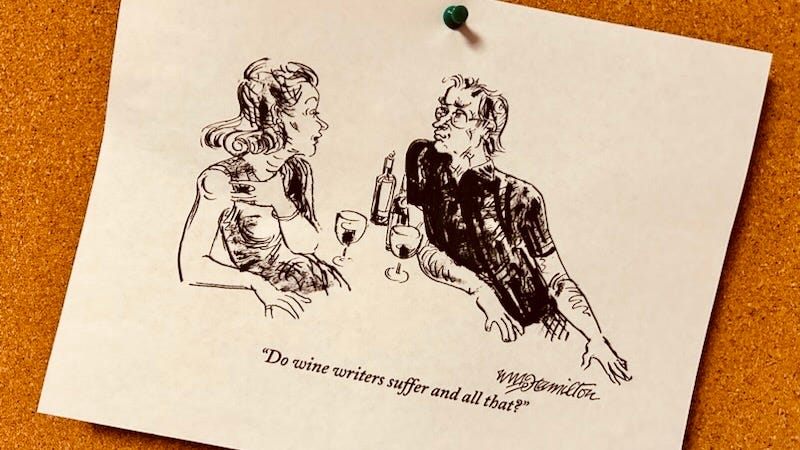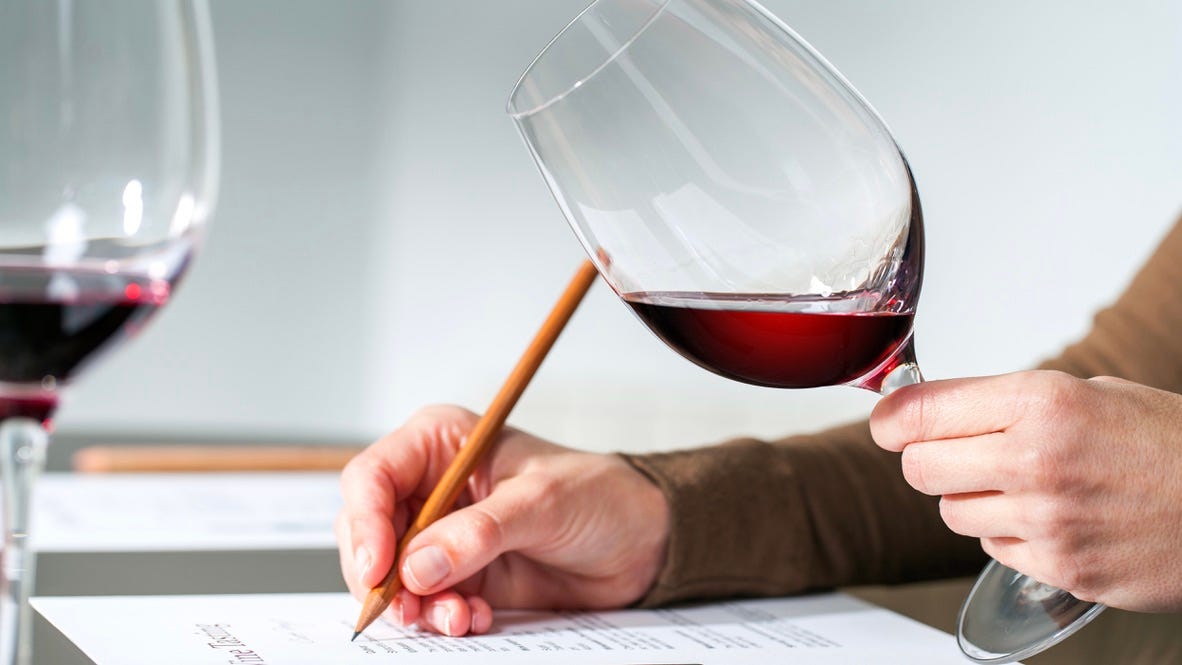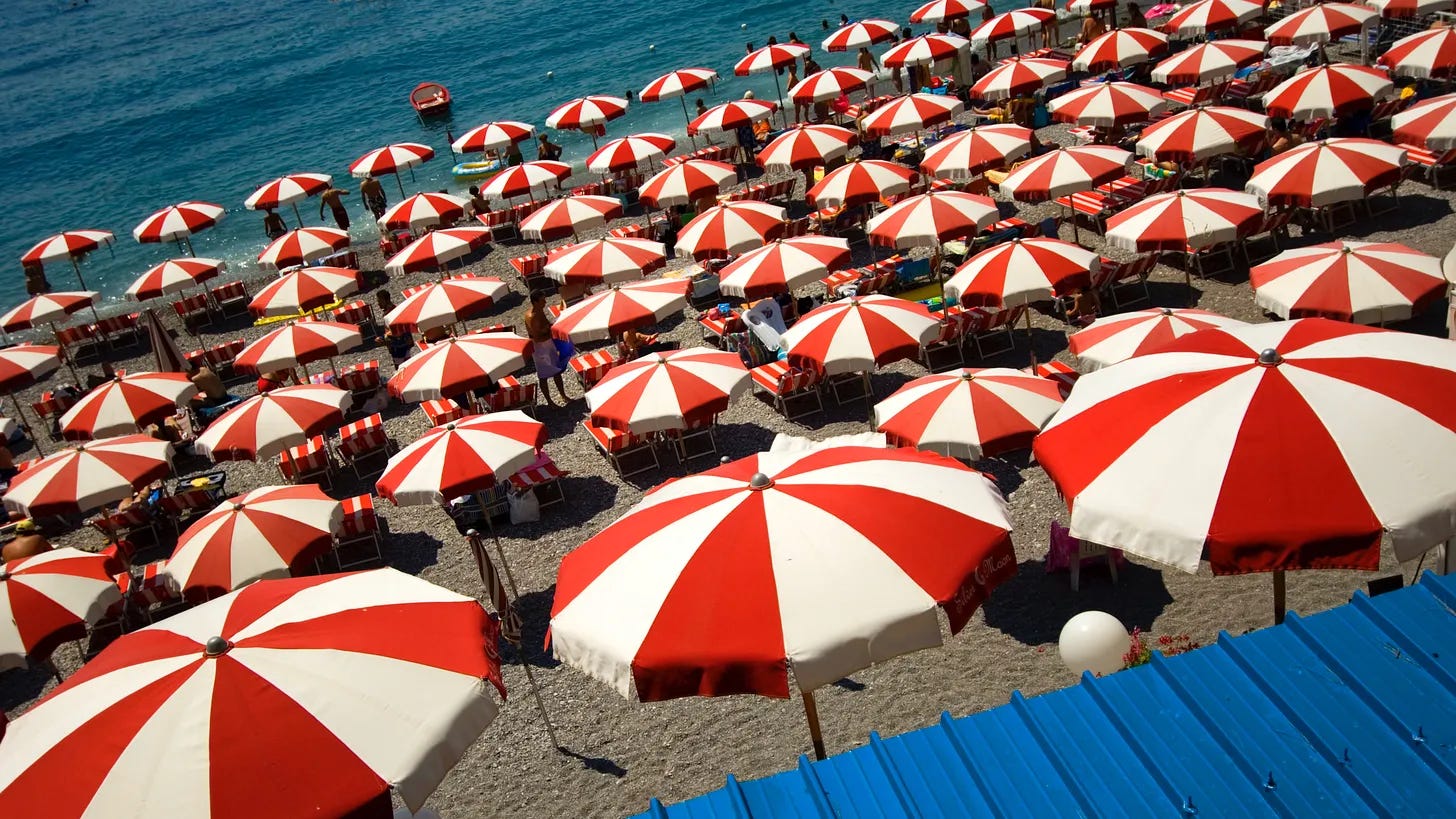Wine Writing Is Travel Writing. At Least It Could Be.
Unfortunately, most of it is not, and that's one reason why we suffer through so much poor wine prose.
For years, I’ve had a New Yorker cartoon tacked near my desk: A man and woman sit at a table and gaze at one another over glasses of wine; the woman, her hand clutching at her bosom, says to the man, “Do wine writers suffer and all that?” Hopefully, I do not have to explain the irony. I mostly keep this cartoon on my wall in a vain attempt to remind myself: Do not take yourself too seriously. But the cartoon is also there to emphasize a key difference between the two genres I work in: wine writing and travel writing.
Wine writing should, or could, be an adjunct to travel writing. Wine takes a writer like me on amazing journeys around the world. But I’m always surprised how dissimilar the two genres have become. Part of that has to do with the lack of immediate, visceral drama that happens on my wine itineraries. When I travel to write about wine, I go to some of the most beautiful places on earth, where I drink rare bottles from some of the world’s best winemakers, and dine in some of the world’s finest restaurants. While this is all fantastic, and a lovely way to pass one’s life—and you should certainly not cry for me—it does not generally offer up the gripping, dramatic, universal experiences and conflict that are the linchpins of compelling narrative nonfiction.
“Hmmmmm,” says the wine writer, swirling, sipping, and spitting in the tasting room overlooking the gorgeous vineyards. “The tannins on the 2019 are still a bit green and aggressive at moment, yeah? And how much new oak are we tasting? Hmm. How disappointing. Perhaps it needs a few more years in the cellar? Sigh. What a pity.”
As the woman in the cartoon asks, “Do wine writers suffer and all that?”
Travel writing—at least good travel writing—is about travail. We’ve been told that travel without suffering makes for a lousy story. As Camus once wrote, “What gives value to travel is fear.” Whatever I feel about, say, a disappointing cabernet franc harvest in Chinon, it is far from fear.
Now, I am not complaining that wine writers do not suffer sufficiently. But I think too much wine writing is myopic. Too often, I find myself reading a piece on a wine region that could have just been cribbed from Wikipedia, Wine-Searcher, or Wine Folly. Or else it’s literally a report on the weather and the soil. “You’re right there in the place!” I want to scream. “Open your eyes and tell us what you see!”
Likewise, I am by no means making the case that travel writing, as a genre, is in any better place than wine writing. Just look at the shallow, SEO-driven articles and listicles published in most travel publications.
This week, the Washington Post’s travel section asked ChatGPT, the artificial intelligence chatbot, to plan a tour of Washington, D.C. The author spent much of the article defensively pointing out ChatGPT’s shortcomings as a travel guide. But honestly, was the AI so much worse than many of the service pieces that pass for travel journalism these days? This is the same Washington Post, we should note, that recently shut down one of the few forums left for narrative writing about place. So it will be hard to feel too bad when the robots finally take over its travel section.
I guess what I’d like to see is more travel writing in wine writing, and vice versa. If wine is about nothing else, it is about place. And writing about place is about more than a geologic report, a topographical study, or a dispatch from a cozy tasting room.
Over the past two weeks, I posted two pieces about Lisbon—one on “old” Lisbon and one on “new” Lisbon—that readers seemed to enjoy. I’m committed to the blurring of lines between wine and travel writing. In fact, here are five more examples below:






Wine writing is wine, and travel, & so much more. I used to subscribe to Gourmet, at least a couple decades before it was shut down. And I think William Asher was the wine writer then. I loved his articles. And I don’t drink wine. But his articles were wine, and culture, and geography, and more. I learned so much from them.
As I do from your writing.